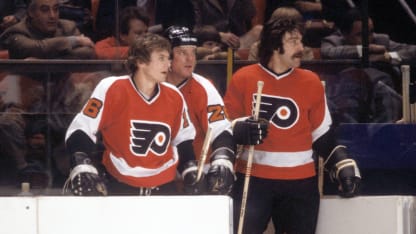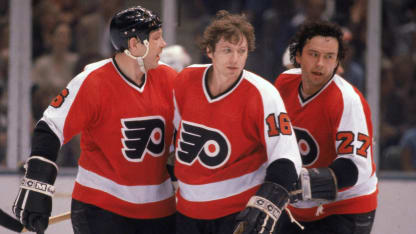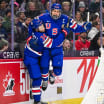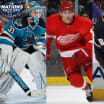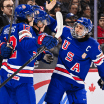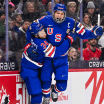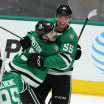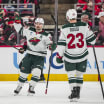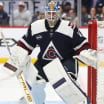Quinn had played against a number of his players in nine seasons as an NHL defenseman, and he knew others from stints as an assistant coach with the Flyers in 1977-78 and as coach with Maine to start 1978-79. He returned to the Flyers as coach later that season when Bob McCammon was fired with 30 games remaining in the season.
"He was a man's man," Holmgren said of Quinn. "Just walking in the room he had your respect. He didn't really change a lot from what we were doing in the Fred Shero days, just a different voice delivering it. … Quite frankly, nobody wanted to disappoint [Quinn]. Everyone knew what Pat was talking about, and because of that respect, no one wanted to disappoint him."
The Flyers tied the NHL record of 28 straight games without a loss (the Canadiens had 23 wins and five ties between Dec. 18, 1977, and Feb. 23, 1978) when Wilson scored with 4:08 remaining in the third period for a 1-1 tie against the Pittsburgh Penguins on Dec. 20, 1979.
Two days later, the record was theirs when they defeated the Boston Bruins 5-2 at Boston Garden.
"That game, I would classify it as a mini war," Barber said. "It was a tough game, lot of guys were beat up. We accomplished [the record], but we kept going."
The wins kept coming into the new year, including a 5-3 victory against the New York Rangers at Madison Square Garden on Jan. 4, 1980, that pushed the streak to 34 and set a new all-sports North American record, besting the 33 straight games won by the Los Angeles Lakers of the NBA in 1971-72.
The Flyers defeated the Buffalo Sabres 4-2 at Memorial Auditorium on Jan. 6, the third time they defeated them during the streak, to reach 35 in a row.
One night later, against the Minnesota North Stars at Met Center, Barber gave the Flyers a 1-0 lead 3:49 into the first period, but the North Stars scored the next seven goals for a 7-1 win.
It was the Flyers' first loss in 86 days.
During its history-making run, Philadelphia got at least one goal from 18 players, topped by 25 by Leach, 21 by MacLeish and 20 each for Propp and Barber.
The Flyers won six one-goal games and 11 two-goal games. They rallied from down two goals eight times and from down three once, and they came from behind in the third period to prolong the streak six times.
The Flyers continued winning after the streak ended, reaching the Stanley Cup Final, which they lost in six games to the New York Islanders.
That loss, though, does little to dampen the memories of their streak.
"It was a great run, great bunch of guys," Barber said. "There's memories and moments, and that was a memory, not a moment. A great accomplishment by a great team."
